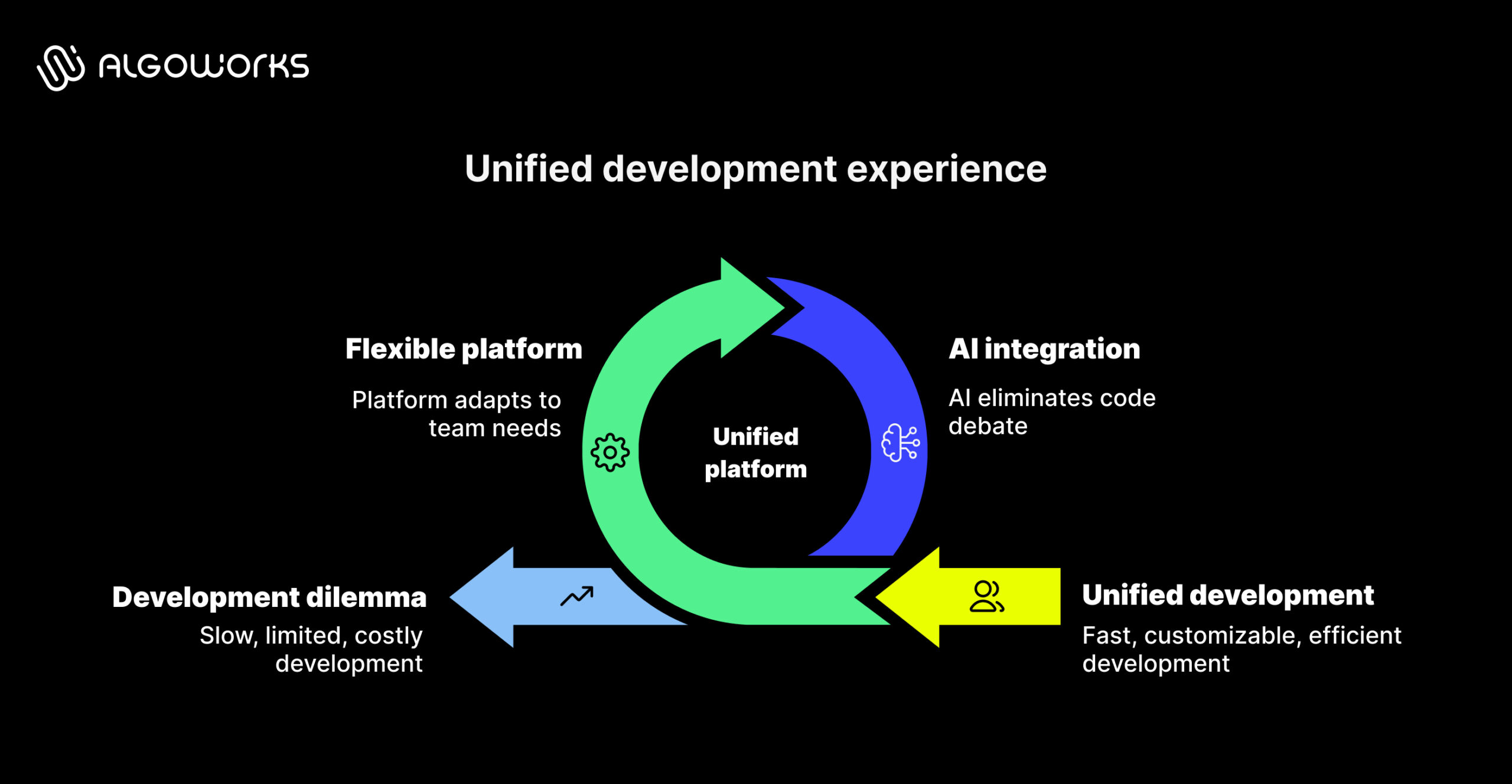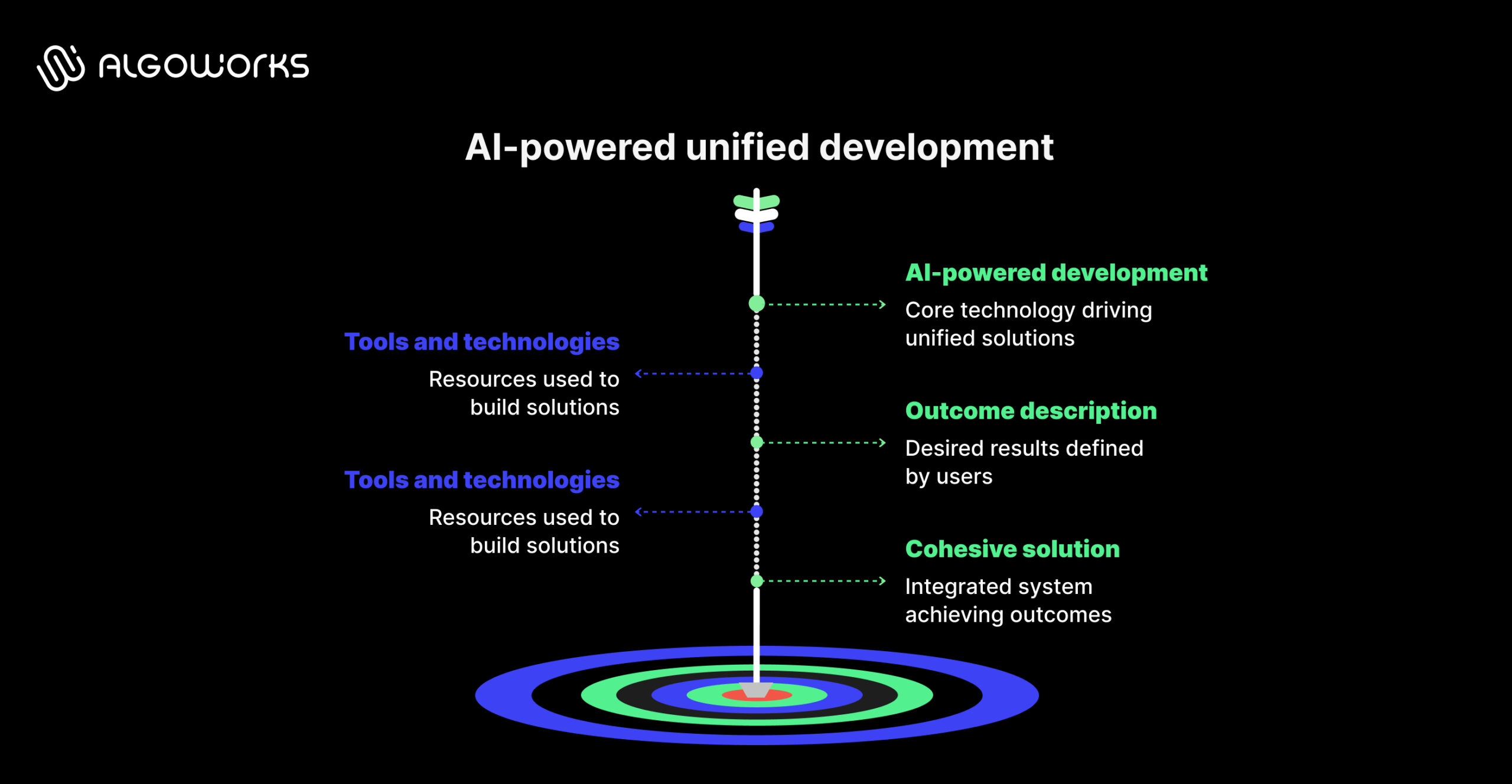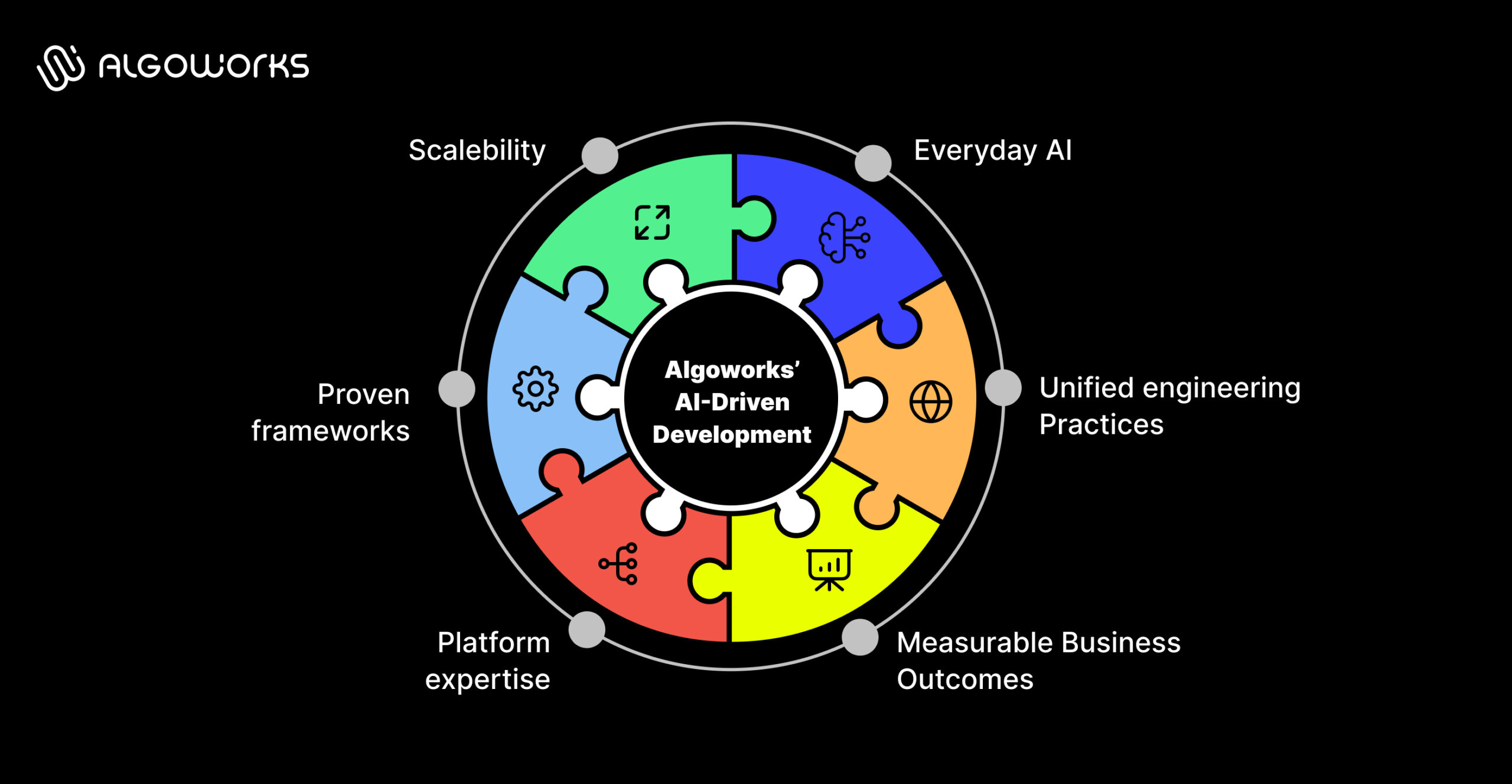Low-code vs. pro-code is dead: AI just changed everything

Your development teams face an impossible choice every day: deploy fast with low-code platforms and hit walls when you need customization or build everything from scratch with pro-code development and watch weeks disappear into simple automation tasks.
It’s costing you more than time. Your marketing team needs lead scoring but can’t integrate with your custom pricing engine. Ops team also wants workflow automation but doesn’t want to wait months for dev resources. Meanwhile, your competitors are shipping products while you’re still debating methodology.
Here’s what changed:
the low-code development market hitting $187 billion by 2025 signals that enterprises are done accepting artificial limitations.
And AI-powered development just made the entire low-code versus pro-code debate completely irrelevant. It’s time to shift the focus to a unified development experience; where platforms flex around the development team’s needs instead of forcing you to fit into theirs.
Also read: Unlocking the power of AI – Everyday AI for business transformation

The real cost of choosing sides
Let’s break down what this divide actually does inside organizations.
In low-code app development environments, teams move fast at first; drag-and-drop interfaces, quick automation, faster releases. But when you hit complex business logic or need deep system integration, everything slows. Developers end up hand-coding workarounds, breaking what was supposed to be “no-code,” and maintenance becomes a nightmare.
On the pro-code development side, engineers have full control but limited time. Every small feature: workflow, data sync, dashboard; needs manual effort. That slows delivery, adds backlog pressure and burns out high-value talent on repetitive tasks that shouldn’t require deep coding in the first place.
What unified development actually delivers
Once the divide is removed, development becomes faster and more cohesive. AI in app development connects low-code speed with pro-code depth. Business users can automate workflows, while developers handle custom logic; all within the same environment. Unified development means using visual tools where they work best and code where it’s needed. No more choosing sides.
Take a customer onboarding process. It needs workflow automation, document checks and billing integration. Traditionally, low-code development platforms handled the workflow, but custom development was still required for validation and system connections; causing delays and extra handoffs.
With AI-powered development, everything comes together:
- Visual flows manage onboarding steps
- Custom code handles document verification
- Automated connectors link billing or CRM systems
- Security and compliance are built in from the start
No tool-switching, no integration gaps. Analysts and developers work from the same canvas, each focusing on their strengths. The result is a single, unified workflow that’s faster, cleaner and easier to maintain.

The AI agent opportunity nobody’s talking about
AI agents are the clearest proof of what unified development can do. Until now, building them was messy; conversation design handled by one team, business logic by another and integrations left to engineers trying to stitch it all together. The result? Delays, disconnects and projects that often stopped before delivering real value.
With AI-powered development, that complexity collapses. You describe outcomes “resolve customer queries, process returns, escalate complex cases” and the platform builds a cohesive solution using the right tools for each layer. Companies see 58% revenue increases by reallocating engineering resources from routine development to high-impact innovation.
That’s not a marginal improvement; it’s a fundamental shift in how you deploy technical talent. Your competitors are already building this way. The gap between organizations that embrace unified development and those that don’t will be measured in quarters, not years.
Check out: Why should business leaders prioritize AI literacy?
What changes for your organization
Your engineers stop spending weeks connecting modules and instead focus on improving intelligence, performance and reliability. Business users can design workflows without waiting on IT. Everyone works on the same system, guided by shared AI context.
Here’s what this shift delivers:
- Faster time to market: unified tools mean faster execution, fewer handoffs.
- Smarter use of talent: AI handles repetitive build work so developers focus on high-impact design.
- Cleaner architecture: optimized code generation reduces technical debt from day one.
- Measured business outcomes: better velocity, better alignment, better ROI.
Ask yourself: are your teams still debating low-code development vs pro-code development or already building unified solutions that adapt as they scale?
This isn’t a full teardown of your development culture. The transition starts small: one feature, one workflow, one pilot. Measure the results, expand and evolve your architecture gradually.
Why this matters right now
Teams adopting AI in app development accelerate; they don’t slow down. Citizen developer apps grow 5x faster than traditional IT can support. Customer demand won’t wait for perfect processes or legacy team structures.
Organizations clinging to the old divide lose competitive advantages daily. The talent reality compounds this: you can’t hire enough engineers to maintain the old model and meet your commitments. You need low-code development platforms that multiply effectiveness.
The products winning in 2025 aren’t necessarily those built by the biggest engineering teams. They’re built by organizations with unified development practices powered by AI at enterprise scale. Development consultants see this shift firsthand; clients who adopt AI-powered development approaches ship faster and outpace competitors who maintain separate low-code and pro-code silos.

Ready to eliminate the development divide in your organization?
Algoworks specializes in Everyday AI and powers development and unified engineering practices that deliver measurable business outcomes; without disrupting current operations or requiring massive retraining investments.
Our development consulting team brings deep platform expertise and proven frameworks for AI-assisted engineering that scale with your vision and roadmap. Schedule a strategic consultation to explore how AI-powered development can transform your velocity while your competitors are still debating methodology.
The future isn’t choosing between speed and power. It’s having both. Let’s build that future together. Contact Algoworks today.
FAQs
Does AI-powered development mean we don’t need experienced developers anymore?
Not at all. It elevates them. Instead of spending days on CRUD interfaces or basic integrations, developers focus on architecture, performance optimization and genuinely complex problems that require human insight. AI handles routine work, freeing senior talent for strategic challenges that differentiate your offering.
How do we maintain code quality when more people can contribute?
AI development platforms generate optimized code that follows best practices automatically. Combine this with proper governance frameworks—something experienced development partners help establish and quality actually improves because you’re not relying solely on individual developer discipline or catching issues in late-stage code reviews.
What about our existing teams and development processes?
You don’t disrupt everything overnight. Start with one feature that traditionally would hit the low-code/pro-code wall. Build it using AI-powered development and unified practices. Measure the velocity difference. Expand from there. Most teams see measurable improvements within the first quarter.
